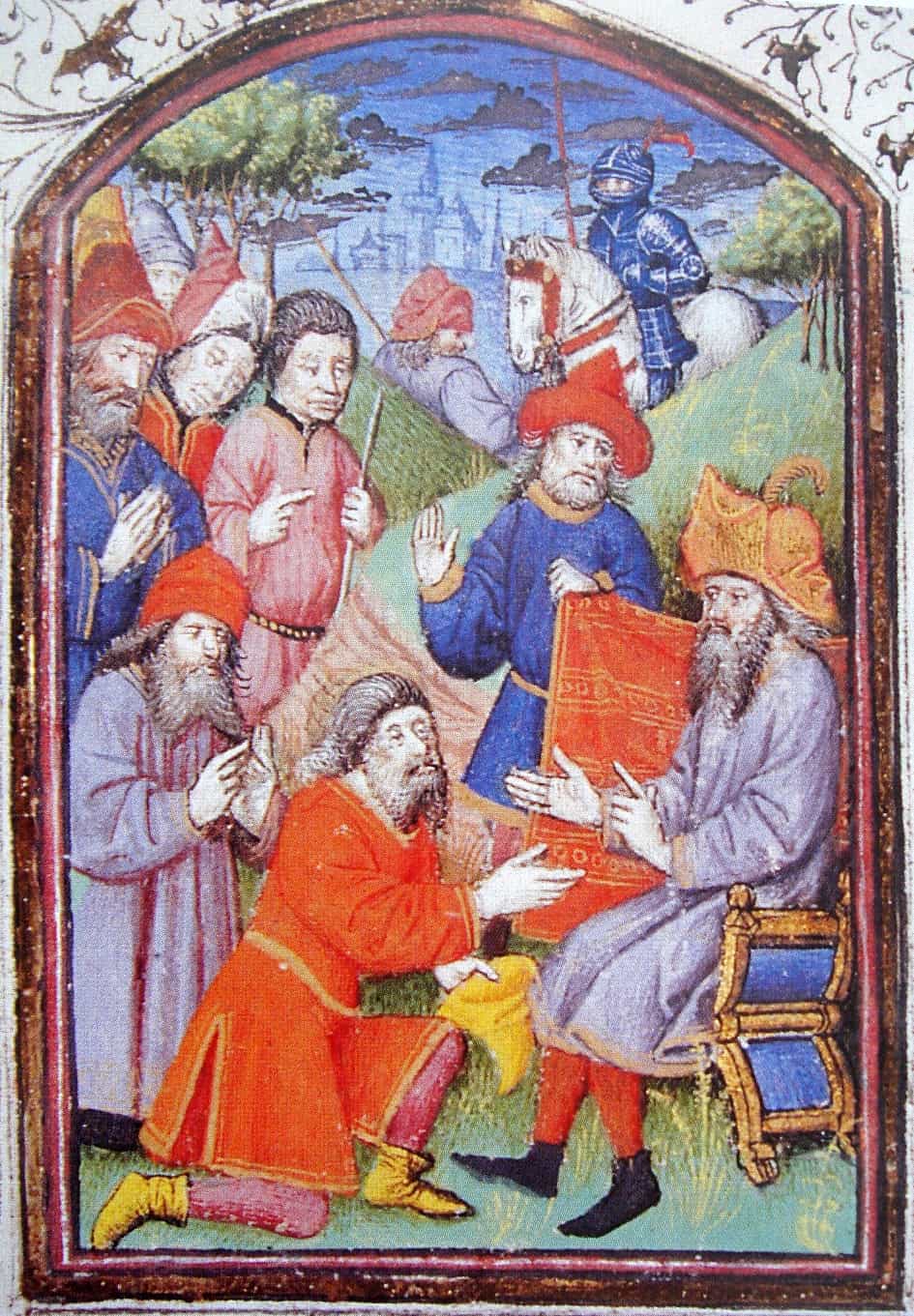Hethum I (seated) in the Mongol court of Karakorum, receiving the homage of the Mongols (miniature from “Flower of the Histories of the East,” written by his nephew Hethum of Korikos, 1307)
Hethum I, King of Cilicia (1226-1270), has been hailed for his diplomatic skills as one of the major players in the Near East during the expansion of the Mongols. French historian René Grousset wrote: “History must hail in him one of the most lucid, one of the most powerful political geniuses of the Middle Ages.”
Hethum was born in 1215. His father Constantine, Lord of Baberon, one of the most powerful Armenian nobles, and his mother Alix Pahlavuni of Lambron was a third cousin of King Levon I (1198-1219). After the death of the king, who left no male heirs, Constantine became regent for his daughter, Queen Zabel. She was initially married to Philip (1222–1225), son of Prince Bohemond IV of Antioch. However, her husband undertook a policy of Latinization, which was resented at once by the Armenian nobility. As a result, Philip was imprisoned and then died in jail. Constantine forced Zabel to marry his own son, Hethum, on June 14, 1226, and the couple became co-rulers. Various coins of the kingdom portrayed them together. They had eight children: the future King Levon II, Toros, Sibil, Euphemie, Rita, Maria, Rouben, and Vasak, who died at the age of four.
The rule of Hethum I and his wife (died in 1252) was characterized for the cultural and economic flourishing of the kingdom. The young king became a major player in the political struggles and shifting alliances around the Crusader states of the Near East in a very complex period for the Armenian state of Cilicia. Armenians had been primarily aligned with the Europeans since the beginning of the Crusades in the late eleventh century, but the unstoppable might of the Mongol Empire became a source of serious concern during Hethum’s reign. As the Mongols approached the borders of Cappadocia and Cilicia, King Hethum made a strategic decision to enter into an alliance with them. After a preliminary agreement with Mongol general Bachu in 1243, he sent his brother, Constable Sempad, to the Mongol court in Karakorum in 1247. Seven years later, in 1254, King Hethum himself traveled through Central Asia to Mongolia to renew the agreement. He passed through the Turkish states of eastern Asia Minor, the Mongol camp at Kars in Greater Armenia, the Iron Gates of Derbent on the western shore of the Caspian Sea, and from there he crossed Asia to Karakorum, where he met Möngke Khan. Historian Kirakos Gandzaketsi, who was in the king’s retinue, recorded a unique account of his travels in his History of Armenia, which has been translated into various languages. It offers a significant set of observations about Mongol, Buddhist, and Chinese culture, geography, and wildlife.
On his way back from Karakorum, Hethum passed through Samarkand and northern Persia. He also visited the Mongol leader Bayju, and he witnessed Bayju’s victory in Asia Minor against the Seljuk Turks.
The Armenian king strongly encouraged other Frankish rulers to submit to Mongol suzerainty, but only his son-in-law, Prince Bohemond VI of Antioch, followed his example and submitted around 1259. Armenians participated in the capture of Baghdad by the Mongol army in 1258, as well as in the siege of Aleppo and the fall of Damascus in 1260.
Despite the Mongol territorial gains, the Egyptian Mamluks rallied and defeated them in September 1260 at the historic battle of Ain Jalut, driving them back across the Euphrates River.
During the last years of Hethum’s reign, his active support of the Mongols became one of the reasons for increasing hostility from the Mamluks, who invaded Cilicia in 1266. While Hethum was bringing Mongol reinforcements, the Armenian army, heavily outnumbered, could not hold off the Mamluks at the battle of Mari, during which Hethum’s son Levon was captured and imprisoned, and his second son, Toros, was killed. Following the disaster, the cities of Adana, Tarsus, and Ayas were assaulted, and Sis, the capital was sacked and burnt. Thousands of Armenians were massacred and 40,000 taken captive. After two years of painful negotiations, Hethum was able to ransom his son in 1268 by making important territorial concessions to the Egyptians, who overran and occupied the allied Principality of Antioch in the same year.
Discouraged by these failures, Hethum abdicated in favor of his son Levon II (1269-1289) and took the habits with the name of Makar, retiring to the monastery of Drazark. He passed away on October 28, 1270.

